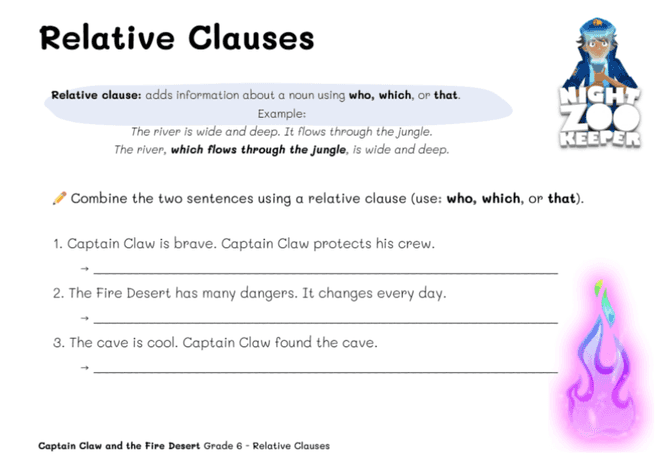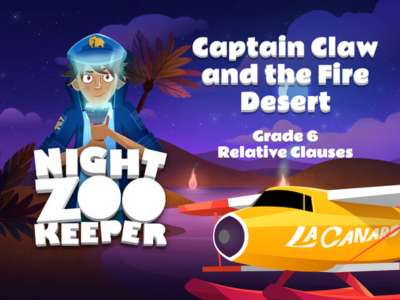Grade 6 Grammar Worksheet

Home > Resources & Worksheets > Grammar > Grade 6
By Grade 6, students are becoming confident, independent writers who are ready to refine their grammar and sentence-building skills. One of the key grammar topics they’ll explore this year is relative clauses - an important tool that helps writers add detail, variety, and sophistication to their sentences.
Learning to use relative clauses helps children connect ideas smoothly, avoid repetition, and create writing that flows beautifully from one idea to the next.
Typical grammar topics covered in Grade 6 include:
Relative Clauses - Adding detail and connecting ideas with who, which, that, and where
Sentence Variety - Mixing simple, compound, and complex sentences
Verb Tenses - Maintaining consistency in longer pieces of writing
Punctuation - Using commas correctly around clauses
Advanced Conjunctions - Expressing contrast, reason, and condition
Editing & Proofreading - Refining grammar, structure, and flow
What are relative clauses?
A relative clause is a type of subordinate clause that gives more information about a noun in a sentence. It often begins with a relative pronoun, such as who, which, that, whose, or where.
Examples:
The zookeeper who discovered the secret portal was very brave.
I love stories that take place in the Fire Desert.
The flamingo whose feathers glowed in the dark led the way.
Each relative clause adds extra detail - telling the reader which one, what kind, or more about the noun it follows.
Defining vs. non-defining relative clauses
There are two main types of relative clauses your child will learn about:
- Relative Clauses
These give essential information about the noun.
They do not need commas.
Example: The animal that lives in the forest is very rare.
- Non-Relative Clauses
These add extra information that isn’t essential to the meaning of the sentence.
They do need commas.
Example: Florence the Flamingo, who is Will’s friend, loves to sing.
Understanding the difference helps children use punctuation correctly and write sentences that make sense and sound natural.
Relative clauses help writers add variety and precision to their work. They allow children to describe characters, places, and ideas in more depth without making their sentences too long or confusing. Mastering this skill marks an important step toward secondary-level writing, where clarity, style, and sentence control become even more important.
Encourage your child to look for relative clauses in books they read, or to try adding one to a simple sentence during writing practice!

How Night Zookeeper can help

Night Zookeeper uses gamified learning to make reading & writing fantastically fun for children aged 6 to 12!
Our reading & writing program for kids can be used for homeschooling, or as a supplemental learning resource. There are thousands of award-winning activities available, including word games, reading comprehension challenges, interactive lessons, and practice worksheets for your child to fill in and learn.
Sign up today to get a 7-day FREE trial!
More resources
Related Content


Make Reading & Writing Fantastically Fun!
- Award-winning reading & writing program for kids
- Improves spelling, grammar, punctuation & vocabulary
- Over 1,000 different learning games and activities



